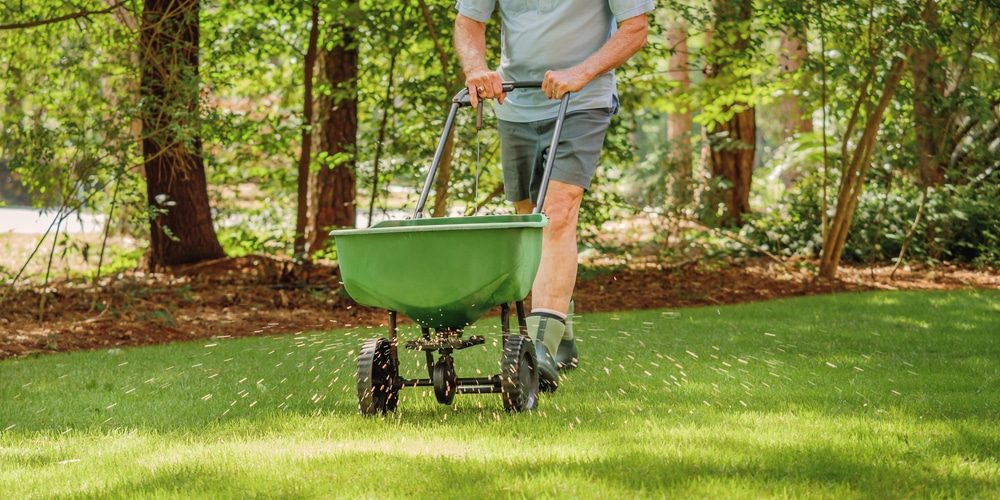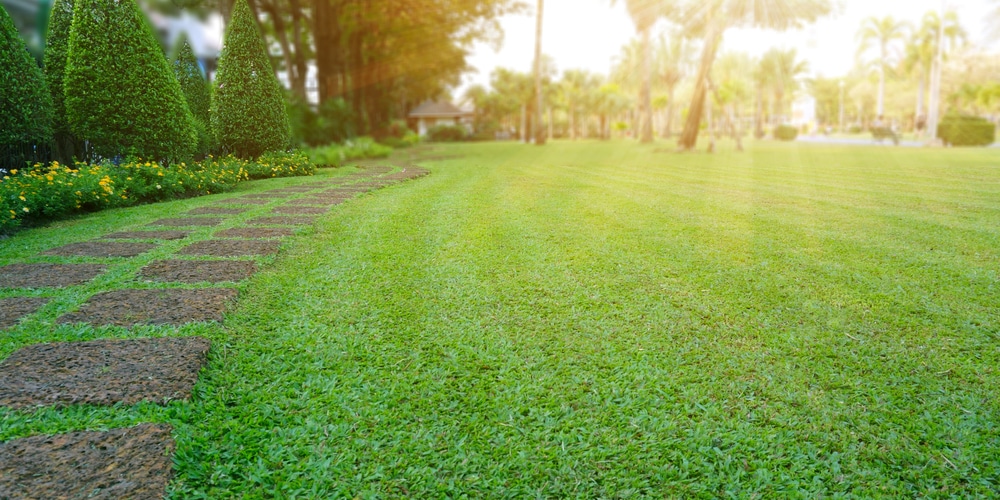Recently, the use of chemical fertilizers in lawns has been under scrutiny. There are significant health and environmental risks associated with using chemicals and non-organic products when fertilizing your lawn, plants, or vegetables. With the increase in organically produced products available, you may be wondering whether to use organic lawn food or a traditional fertilizer.
Lawn food and fertilizer may seem like very similar products, but there are a few differences between the two. Let’s look at lawn food vs. fertilizer to help you make the best choice for your yard.
Lawn food vs. fertilizer: What’s the difference?

The first difference between lawn food and fertilizer is the actual ingredients. Lawn fertilizers often contain chemicals such as nitrogen, phosphorus, and potassium. Inorganic compounds are also commonly found in fertilizers, including sulfur, iron, and zinc oxide.
You need to know what ratio of these ingredients is best for your lawn. 46-0-0 fertilizer is not the same as 14-14-14 (although you can rarely go wrong with 46-0-0).
Organic lawn foods, however, do not contain chemicals or non-organic products. The main ingredient of organic lawn food is compost. Compost is made by breaking down organic materials with micro-organisms to produce a rich soil full of vital nutrients for your yard.
Fertilizers are applied on lawns before or after they are mowed, even in winter. Lawn foods also come in different formulas, and depending on the formula; you may need to apply before your lawn is mowed. You can test the soil to see if it’s missing a particular nutrient and then apply this in the form of lawn food.
Another difference between lawn food and fertilizer is the results they provide for your grass. Lawn foods are slow-release products, which means that nutrients from organic compost or manure will be slowly released into the soil over a period of time. This ensures that there is no sudden nutrient shock to your lawn grass.
On the other hand, Fertilizers will provide an immediate boost to your lawn, but only while the fertilizer is in effect. This means you must reapply fertilizer regularly to keep a healthy lawn. Lawn foods do not need to be applied as often, but they should still be used throughout the year for a lush green yard.
Lawn food vs. fertilizer: Which is better for a healthy lawn?

Choosing between lawn food and fertilizer comes down to your lawn’s health. A healthy lawn needs both organic nutrients and chemical fertilizers. If you prefer not to use chemicals on your yard, then an organic product such as compost or manure would be best for you. They provide your lawn with organic nutrients that will help to strengthen and feed your grass.
Where an overused chemical fertilizer may damage the environment and the community, a healthy lawn is beneficial for everyone. Your lawn will need regular compost or manure applications in order to maintain a lush green color throughout spring, summer, and fall.
Fertilizers
Chemicals are often used to manufacture traditional fertilizers. Although they will not burn your plants or grass if used in the correct dose, these chemical fertilizers (such as 5 10 10 fertilizer) can leach into the soil after rainfall and pollute waterways through run-off reaching our rivers, lakes, and oceans.
Chemical fertilizers are extremely effective, but if overused, they can cause certain elements to build up in the soil and eventually create a toxic environment for plants. Some toxic chemicals can even be hazardous to your pets or family members if they are exposed to the chemical residue left over after application.
Organic Lawn Food
Organic fertilizers are generally made from plant and animal sources providing nutrients for your grass naturally. They also contain added beneficial microorganisms, which make them more effective for your soil’s long-term health. The breakdown process for organic fertilizers is much slower than chemical fertilizer, so your soil will stay healthy and well-balanced. You also don’t need to apply organics as often, which reduces the risk of over-fertilizing your lawn or plants.
Organic fertilizers can provide your grass with a wide range of nutrients and microorganisms in a safe way. They don’t leach into the soil and only contain natural elements which benefit your lawn and garden.
Conclusion
When deciding whether to use lawn food vs fertilizer, it’s essential to consider the benefits of both products. Organic lawn food generally provides a more long-term benefit for your soil and grass than fertilizer while also being safer for the environment and your family.
If you want to use a fertilizer, look for an organic nitrogen-based fertilizer that is safer than chemical options.